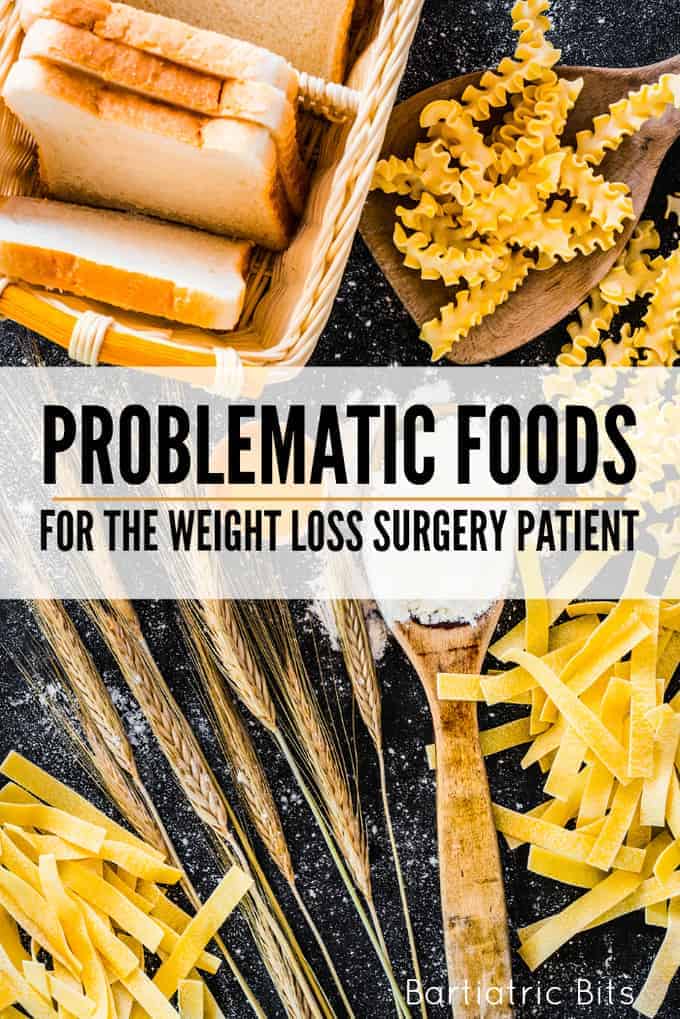Why Avoid Porkchop, Steak and Beef After Bariatric Surgery
Many patients believe before weight loss surgery that they won't exist able to swallow many of the foods they are accustomed to. While nutrient choices demand to improve at that place really isn't a whole lot of food that patients can not physically swallow. Here are 12 problematic foods after weight loss surgery that are common among patients.

Every patient is unlike. In 10 years I accept seen patients who could tolerate all foods quickly after their surgery and then patients who years later still had to avoid a select few foods. The get-go year is really when most patients have difficulty tolerating a number of foods. Usually, afterward a twelvemonth tolerance improves for many patients and their eating becomes more normal and more inclusive.
I have put together a list of 12 foods/food groups that requite patients that are the near problematic. By problematic I more often than not mean intolerance. What does intolerance mean? Intolerance, in general, is a physical reaction or discomfort that patients experience when they eat these foods.
Signs and symptoms of intolerance:
- Chest pain or discomfort
- Nausea
- Airsickness
- Heartburn or indigestion
- Tummy pain
- Diarrhea
While most of the foods/food groups on this list may cause some of the to a higher place symptoms others are in that location because they affect patients progress by adding extra and unnecessary calories.
12 Problematic Foods After Weight Loss Surgery:
- Bread: mashy bread like rolls and sliced sandwich bread are sticky and too heavy for the small-scale stomach.
- Pasta: like bread, pasta is sticky and tin can fill up a small pouch quickly.
- Rice: regardless of whether the rice is white or dark-brown all rice causes the same issues as pasta and staff of life.
- Oatmeal: in early stages, oatmeal can be heavy and very filling. I generally recommend waiting until about 5-6 weeks to try oatmeal.
- Fruits and vegetables with tough skins: fruit/veggies like apples and cucumbers have hard, very gristly outer skins. These fibrous skins should normally exist part of a salubrious diet, simply bariatric patients can have difficulty tolerating anything that is difficult to completely chew.
- Tough meats: these foods are difficult to chew sufficiently afterward surgery.
- steak and other red meat
- chest meat of chicken and turkey
- heavy fish like salmon
- Grilled meats: anytime you grill nutrient you are making the outer surface harder, which may consequence in patients having difficulty chewing.
- Desserts: high fat, high sugar foods not simply add extra calories they may as well pb to dumping syndrome in sure patients.
- Sugary Drinks: like desserts, sugary drinks provide unnecessary calories that may hinder weight loss or result in weight gain. Again, dumping syndrome may occur in certain patients.
- Alcohol: surgeons ofttimes have different recommendations regarding alcohol consumption. In gastric bypass patients, at that place is a higher risk of ulcer development in patients who eat alcohol. Regardless though for whatever patients alcohol provides empty calories.
- High-fatty foods: some patients will experience dumping from consuming higher fatty foods such as fried food, desserts, butter, and high-fatty dairy products. Fat provides twice the amount of calories per gram than that of carbohydrates and protein, so consuming high-fat foods on a regular basis will result in the consumption of backlog calories that will touch on weight loss long-term.
- Snack food: "junk" food like chips, cookies, candy etc are actually easy to eat after surgery. Any food that crumbles or melts volition non take nigh a lot of space in your stomach. Many patients think that portion sizes of all foods will exist decreased after weight loss surgery, however, the density of the food is what volition determine the portion size and level of satiety. And so, a patient tin consume large amounts of these foods. Like many of the foods mentioned already, snack foods volition crusade an increased intake of calories that will effect in slower weight loss, weight plateaus, or weight gain.
Weight loss surgery patients have limited real estate. There is only so much nutrient you tin can fit into your smaller tummy. Choose wisely!!
Other information you may be interested in:
Diet Stages Subsequently Weight Loss Surgery
How to Prepare for Weight Loss Surgery
Reader Interactions
Source: https://bariatricbits.com/problematic-foods-after-weight-loss-surgery/
0 Response to "Why Avoid Porkchop, Steak and Beef After Bariatric Surgery"
Post a Comment